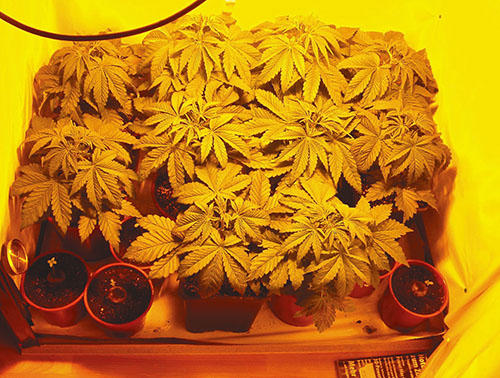On November 8, four states – California, Maine, Massachusetts and Nevada – became the latest to legalize recreational marijuana use and sales, despite the prohibition of the substance under federal law.
In California, 58.4% of voters approved Proposition 64 (as of November 17), which legalizes the sale and use of recreational marijuana by persons aged 21 and older. Prop 64 also imposes a 15% tax on sales, along with a $9.25 tax and a $2.75 tax on the cultivation of flowers and leaves, respectively.
Following suit, as of November 17, 67.66% of Long Beach voters approved Measure MA, while 59.33% approved Measure MM. Measure MA imposes a 6 to 8% tax on the sale of medical marijuana, a 10 to 12% tax on the sale of recreational marijuana and a tax of $12 to $15 per square foot of marijuana cultivation. Measure MM allows the city to permit up to 32 medical marijuana businesses, such as dispensaries, manufacturers and farmers, to operate in the city.

“The way the timeline works is that, in order for MM and MA to go into effect, first the election has got to get certified. That will happen December 13,” Mayor Robert Garcia said in an interview with the Business Journal. “Then the city has . . . a few weeks to set up the process to begin accepting any applications of people who might be interested.”
Garcia said city staff expects to begin accepting applications for medical marijuana businesses in January. However, the city council has not passed any zoning or planning documents as far as recreational sales are concerned. California will not begin issuing licenses for recreational marijuana sales in the state until 2018, Garcia explained, so the Long Beach City Council will discuss recreational businesses and sales at some point in 2017.
Under Measure MM, up to 32 medical marijuana businesses are allowed in the city. Garcia said it is impossible to gauge the exact number that will end up in Long Beach, but he doesn’t think the city will have more than 25 or 26. He noted that just because they are legal doesn’t mean there will be space or that property owners in the private sector will want to lease to the businesses.
Doug Shea, president of INCO Commercial, recalled past experiences leasing to marijuana cultivators. He said, if the occupants are not sophisticated enough, there can be problems with water damage, mold, electrical issues, smell and security. However, Shea acknowledged that, if a quality grower occupies a unit, the issues are nonexistent.
“I have rented to a legal [marijuana business] in Wilmington,” Shea explained. “They were so sophisticated that they had these huge filters and these huge lights and security guards everywhere on the inside and security bars and gates. It’s just insane the amount of security they go through. And they pay high rent.”
Shea said property owners will likely weigh the problems attributed to renting to a marijuana manufacturer against the potentially increased rent for the space. He explained that, for each unit, owners will have a tipping point where the dollars coming in will be worth the headaches, as marijuana-related businesses often pay much higher rent than others. This could cause non-marijuana businesses to be priced out of certain areas.
“The deal that I’m doing right now is a little two-unit facility, and the marijuana guy that is in there is paying $3,500 per month. He said he will pay $7,000,” Shea said. “As a landowner, you have to say that’s good money. Another [business] coming in says I’m not going to pay that and will have to go somewhere else.”
In the months leading up to the election, Garcia, as well as the rest of the city council, endorsed Measure MA, saying there needed to be tax regulations in place in the event that marijuana was legalized. Supporters noted the estimated $13 million in tax revenues that would be brought in by marijuana sales in the city.
“Money will start coming in once the dispensary process begins, but the council has put out a resolution of where the money would go,” Garcia said. “The resolution is pretty clear that the dollars would go to public health, public safety and the cost of managing the planning process. It’s really going to go to fire, police, public health and making sure that there’s a permitting and processing process.”
However, Garcia noted that most, if not all, of the revenue generated by the marijuana tax will be cost recovery due to increased expenditures caused by allowing marijuana in the city. Also, Garcia explained that the estimated $13 million revenue will not come in during the first year but will likely be achieved after several years when all allowable dispensaries are open.
The process of allowing marijuana businesses into the city will be gradual, Garcia said. Because of this, the cost and revenue are expected to grow simultaneously. As far as other costs and problems, Garcia said they are hard to predict because this is an uncharted industry that everyone will figure out together.
He said there will certainly be additional costs in enforcement and public health, as well as regulating and permitting, but he is confident that Measure MA will cover those and is thankful for the voter support. Beyond that, Garcia hopes to learn from past experiences and make the best of the changing environment.
“We have to see. The truth is that, when we had medical marijuana dispensaries before, you had some dispensaries that were very good neighbors, and you had others that were terrible neighbors and were doing terrible things,” Garcia said. “So this go-around, we are hoping that we end up with good neighbors in all the dispensaries. But there will probably be some that will not be, and that will have to be dealt with appropriately. That’s why we have to learn and take it slow and go from there.”
